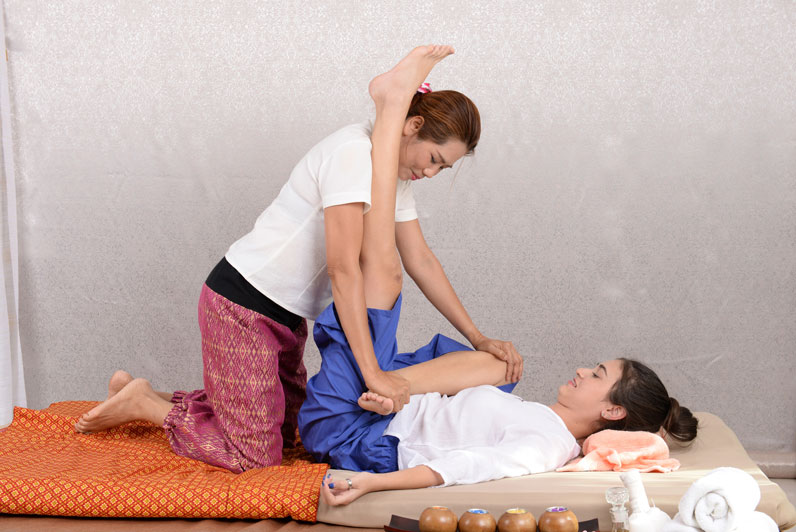What is Thai Massage?
Thai massage, also known as Nuad Bo-Rarn, is an ancient healing practice that originated in Thailand Unlike other massage modalities, Thai massage is performed on a mat on the floor, with the client dressed in comfortable clothing, and is a combination acupressure, passive stretching, and rhythmic compressions focusing on promoting overall wellbeing and balance in the body.
Once considered a niche or fringe modality, Thai massage has, over the years, become a mainstream and widely accepted form of massage. This increased awareness has helped people in the massage profession document the myriad benefits Thai massage offers clients. What is less well documented, however, is all the benefits Thai massage offers the massage therapist.
Practiced properly, Thai massage is said to be equally beneficial for the giver and receiver. One of my first teachers at the Old Medicine Hospital in Chiang Mai jokingly said to me: “Thai massage is the same as Thai boxing except the other person feels good instead of bad.”
He elaborated, explaining that Thai massage is both a form of martial arts and meditation, and that this approach to massage contains the key to career longevity and satisfaction.
Massage therapy can be a physically strenuous occupation. Many massage therapists exit the profession earlier than they had hoped because of repetitive stress injuries and wear and tear on their bodies.
Due to its ergonomic body mechanics reminiscent of martial arts, and the use of gravity and leverage rather than muscle, Thai massage can help prevent the repetitive stress injuries and physical burnout that are all too common among massage therapists.
Some massage therapists even report becoming stronger and more fit throughout their careers, giving them the tools necessary to thrive. Thai massage is also practiced in a meditative and relaxed way.
I learned early on from a teacher that Thai massage is a two-way healing exchange you cannot harbor any tension in your body or your mind while you are working, otherwise the healing exchange is cut short. I can think of no other profession that offers such a mutually beneficial relationship!
2,500 years later, it appears that Thai massage has all along contained the keys to career longevity and fulfillment, as well as increased personal growth and a sense of groundedness. When we practice the Thai way, with gratitude and ease, we are invited to experience the joy and satisfaction of sharing this work with our communities, supporting the health and vitality of all we touch.
Build-In Self Care: Many Options to Work Hands-Free
In addition to the impeccable body mechanics that practicing Thai massage requires and the mindful and meditative aspects of this modality, there are other ways that Thai massage can offer a low impact, non-strenuous way to perform massage.
For example, there are many techniques in Thai massage that can be done hands-free. This means even practitioners with a hand, wrist or shoulder injury that might force an otherwise early retirement from massage can still continue to practice and be successful because performing an entire Thai massage using only the legs and body weight is possible.
Thai massage work also incorporates many hand-saving tools, such as Tok Sen, Herbal Compress, and Pa Kao Mah sarongs.
The Sabai Approach
Another benefit for the massage therapist is practicing in the spirit of Sabai. Sabai is a Thai word that translates to “wellbeing” and “happiness” as well as being a Thai philosophy and way of life. It can be likened to the concept of “aloha” in Hawaii, which means both “hello” and “goodbye” as well as “to live in harmony with the natural world.”
In Thailand, Sabai as a philosophy means to live one’s life in a calm, relaxed, and peaceful manner and not to take yourself or life too seriously. This stems from the Buddhist influence on the culture. In terms of bodywork, it is often taught that when practicing massage, the therapist should be harboring no tension in their body or mind.
Massage is understood to be a healing exchange between giver and receiver. If the giver becomes tense in any way, this healing exchange ceases.
Therefore, practicing massage in a “sabai” way reinforces the notion that when practiced properly, Thai massage is equally beneficial to the giver and receiver. It also speaks to the relaxed manner in which Thai massage is practiced. It is more important for the massage to feel like a rhythmic dance or moving meditation then to focus on precision.
Is Thai Massage Right for You?
If you are a massage therapist looking for a way to save your hands and breathe new life into your career, then perhaps pursuing a specialty in Thai massage will be just what the doctor ordered.
Although it will ultimately be a near effortless way to work, it does come with a learning curve. It takes time to build muscle memory to work in such a different way. I often tell my students that starting their journey in Thai massage is almost like going back to massage school all over again. It is so different from traditional table massage.
However, I believe that your body will thank you. Even if you don’t transition to a mat-based practice, applying the principles of body mechanics and mindfulness to your table-based practice will be transformative.
Learning Thai massage is also more accessible than ever before. When I first started in 2001, I hardly knew any other Thai practitioners and I had to travel all the way to Thailand to get certified. Now, there are many reputable courses and instructors all over the US.
If this article resonates with you and you’re curious about how incorporating Thai massage might benefit your practice and your body, consider Thai massage for your next CE renewal. Your future self will thank you!
